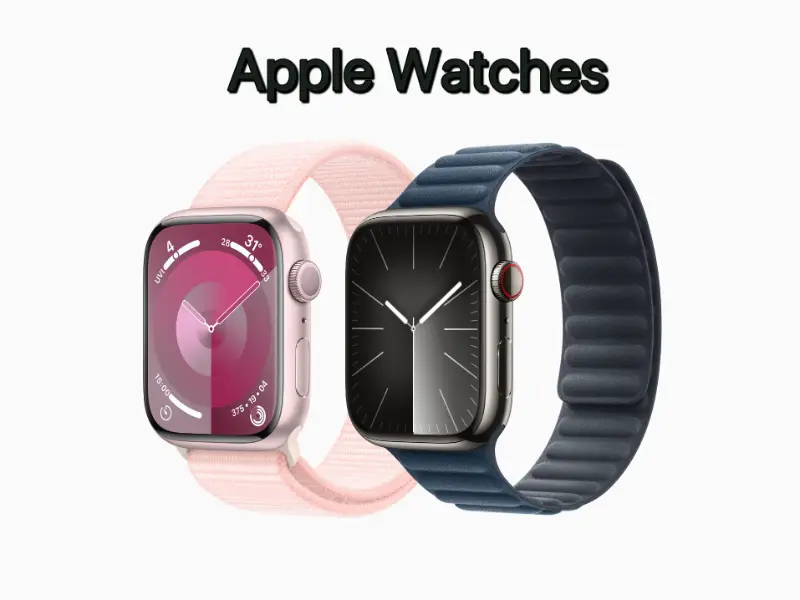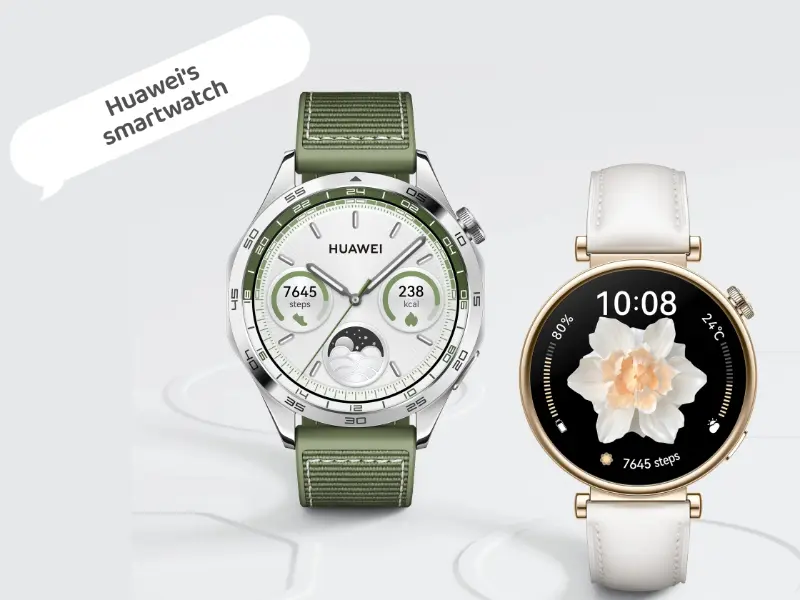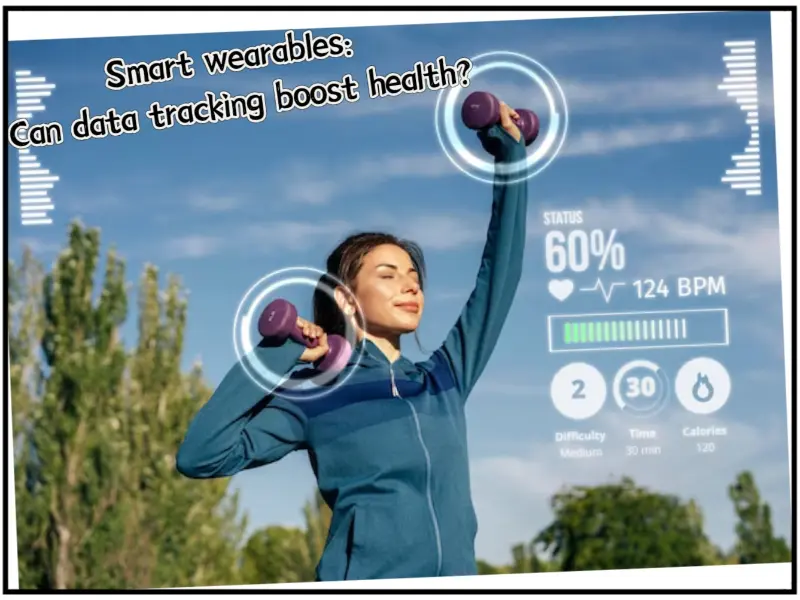- Equipped with advanced sensors and AI, smart wearables transform healthcare through real-time monitoring, influencing pre-surgery assessments and aiding rehabilitation.
- Devices like Apple Watch and Huawei’s smartwatch enhance health awareness, offering features like glucose and continuous heart monitoring, potentially preventing issues and providing cost-effective alternatives.
- Ethical considerations, privacy concerns, and integrating wearable data into clinical practice pose challenges. The future holds possibilities with innovations like augmented reality and next-gen wearables for a more personalized healthcare experience.
Smart wearables have emerged as transformative tools in the realm of healthcare, promising to redefine the way we monitor and enhance our well-being.
From pre-surgery assessments to advanced health monitoring, these devices, equipped with cutting-edge technology, are influencing and potentially enhancing our health in unprecedented ways. But are they as good as the manufacturers claim?
Brief introduction
Smart wearables refer to electronic devices that are worn as accessories or clothing items and are equipped with advanced technologies, such as sensors, connectivity features, and computing capabilities.
These devices are designed to collect and process data, providing users with real-time information about various aspects of their health, fitness, or environment.
Common examples include smartwatches, fitness trackers, and augmented reality glasses, which go beyond traditional accessories by offering interactive and intelligent functionalities. Smart wearables aim to enhance users’ daily lives by seamlessly integrating technology into their personal routines.
Also read: Apple Vision Pro headset launch: Delayed, yet predicted spectacle
The latest technological advancements in smart wearables
The integration of Artificial Intelligence (AI) and machine learning has propelled smart wearables beyond mere fitness trackers.
Rahul Paul, Senior Healthcare Research and Data Analyst at Clarivate, sheds light on the significant role wearables play in orthopedics, particularly in large-joint reconstructive implant segments. Wearable technologies are altering the course of care delivery, offering opportunities for improved patient outcomes.
Advanced biometric sensors have revolutionised health tracking by providing continuous monitoring of vital signs and real-time health feedback. These sensors not only offer personalised health insights but also enable predictive analytics for various health conditions. The seamless integration with smart devices and cloud-based data storage ensures a comprehensive and accessible health profile.

Persona IQ: Smart, connected, and simple with Persona® The Personalized Knee® and CANARY canturioTM technology’s CHIRP system.
Influence of wearables on health
Prior to surgery, wearables play a crucial role in patient assessment. Providers can track activity levels, gait patterns, and sleep quality, providing valuable data for pre-operative planning. This data assists in gauging a patient’s baseline health and fitness level, identifying risks, and tailoring surgical procedures accordingly. Wearables also contribute to patient conditioning through guided exercise programs, promoting muscle strength and joint stability for smoother recovery post-surgery.
An exemplary case is the Persona IQ Smart Implant and the MyMobility App from Zimmer Biomet. MyMobility, a comprehensive digital care platform, collaborates with the Apple Watch and iPhone to deliver services ranging from patient education to physiologic and gait metric recording. This integration with telemedicine facilitated remote consultations during the COVID-19 pandemic, reducing the need for frequent in-person follow-ups.
Intra-operatively and post-surgery, wearables offer remote monitoring through sensors embedded in implants and external patches. Zimmer Biomet’s Persona IQ knee implant, equipped with sensors measuring cadence, speed, stride length, and range of motion, facilitates remote tracking of patient progress. The integration with the MyMobility app provides a comprehensive view of rehabilitation progress.
Rehabilitation guidance is another critical aspect where smart wearables shine. Devices like Stryker’s MotionSense monitor range of motion, daily steps, and activity time in real-time, aiding providers in ensuring patients perform rehabilitation exercises correctly. This not only accelerates recovery but also reduces the risk of injury.
Also read: Apple faces uphill battle as Apple Watch sales resume amidst patent dispute
Advancements in health monitoring
Isaiah Samson, Healthcare Research and Data Analyst at Clarivate, delves into the high-tech advancements in wearables designed for health monitoring. The potential for glucose sensing by smart devices, especially Apple’s initiative with its watches, offers a forward-looking perspective on managing acute conditions like diabetes.
Huawei’s smartwatch in China claims to estimate blood glucose indirectly, providing an early warning for low blood sugar risk. The competition in wearables for managing conditions like diabetes is intriguing, indicating a growing focus on using technology for acute healthcare needs.
Continuous heart monitoring and single lead ECG detection are becoming increasingly prevalent in new wearable devices, despite being in a nascent stage. Positive clinical data supports the usability of these devices, presenting alternatives to intra-cardiac monitoring devices. Apple, since its Watch Series 4, has been contributing to atrial fibrillation detection.
The Apple Heart study, involving over 400,000 participants, assessed the ability of the Apple Watch to identify irregular heart rhythms. Innovations include X-trodes wearable technology, a patch designed for sleep monitoring that also incorporates ECG monitoring. Companies like AccurKardia and Eko have gained FDA approval for novel wearable device algorithms, challenging traditional ambulatory ECG devices.

X-trodes: Maximize electrophysiological signal monitoring for improved healthcare quality, accessibility, and efficiency.
Also read: Holoeyes Secures 400 Million Yen to Expand Medical Virtual Reality
Can data tracking significantly boost our health?
According to Isaiah Samson, the answer is affirmative, especially in the case of glucose monitoring. The development of smart wearable technology has the potential to prevent low blood sugar episodes, providing a positive health benefit and raising awareness.
Investment analysts covering Apple note the manufacturer’s intent to expand into health monitoring, with plans for a light-based glucose sensor integrated into the Apple Watch. This technology aims to warn those at risk of prediabetes, exemplifying the positive impact wearables can have on health awareness.
Zsuzsa Lindenmaier, Senior Healthcare Research and Data Analyst at Clarivate, emphasizes the increasing popularity of cardiac monitoring smart wearables among consumers in the US. Affordable pricing has led physicians to lend these devices to patients, encouraging readings during heart-related symptoms.
Though out-of-pocket expenses exist, cardiologists leverage pre-existing CPT codes for ECG interpretation, generating revenue for event reports sent by patients. Increased awareness through smart wearables and apps is expected to boost visits and prescriptions in the ambulatory ECG market.
Pop quiz
How did one individual’s alteration of bedtime habits based on wearable data lead to positive changes in health?
A. It resulted in weight loss.
B. It increased daily steps from 4,000 to 7,000.
C. It improved social interactions.
D. It enhanced mental well-being.
The answer is at the bottom of this article.
Influence of Wearables on Health
George Yang, Founder of Yanre Fitness and OxygenArk
Intelligent gadgets keep track of your movements and sleep to give you important information about how you sleep and move.
Impact of data tracking on health
George Yang, Founder of Yanre Fitness and OxygenArk, shares insights into the influence of wearables on health. Intelligent gadgets keep track of your movements and sleep to give you important information about how you sleep and move. Clients of Oxygenark experienced life-changing improvements, with one individual altering bedtime habits based on wearable data, resulting in increased daily steps from 4,000 to 7,000. This transformation led to a healthier body and improved sleep quality.
Advancements in health monitoring, including stress level checks, heart rate fluctuations, and blood oxygen level assessments, contribute to a safety net for wearables users. Fall recognition and emergency reaction alerts, especially beneficial for seniors, enhance the tools’ capability to provide timely warnings in emergencies.
The impact of data tracking on health is evident in the positive changes observed among workers participating in health challenges with wearables. Improved sleep and increased daily exercise duration by twenty minutes underscore the role wearables play in promoting awareness and encouraging lifestyle adjustments.

Ethical considerations and privacy concerns
As wearables become more ingrained in healthcare, ethical considerations and privacy concerns arise. Data security and privacy risks demand secure data transmission and user consent, ensuring individuals maintain control over their health information. Potential misuse of health data, including implications of data breaches, necessitates regulatory measures and protections to safeguard sensitive information.
Also read: Is XR the future of healthcare? Surgery, mental health, and brain rehab say yes
The role of healthcare professionals
The integration of wearable data into clinical practice is crucial for maximizing the potential of these devices. Collaboration between doctors and patients, along with remote patient monitoring, empowers healthcare professionals to make informed decisions based on real-time data. George Yang’s perspective on wearables in professional practice adds a practical dimension to the role of healthcare professionals in leveraging wearable technology.

Future trends and innovations
The future of smart wearables holds exciting possibilities, including emerging technologies like augmented reality (AR) applications and next-generation wearable interfaces. George Yang envisions future innovations that will further enhance the capabilities of wearables, contributing to a more personalised and immersive healthcare experience.
Conclusion
Smart wearables have revolutionised health monitoring, empowering individuals to make positive lifestyle changes. The integration of biometric sensors, AI, and real-time tracking goes beyond fitness, as highlighted by experts like Rahul Paul, Isaiah Samson, and Zsuzsa Lindenmaier. Real-world impacts, as shared by George Yang, emphasize the transformative potential of wearables in healthcare.
Addressing ethical and privacy concerns is crucial for responsible use. As wearables evolve, user control and trust in digital health must remain a priority. The future, with technologies like AR and advanced interfaces, promises seamless integration into daily life.
Collaboration between healthcare professionals and wearables is pivotal. Integrating wearable data into clinical practice empowers proactive health management for patients and providers alike.
In summary, smart wearables are essential for better health, fostering awareness and positive lifestyle changes. As technology advances, responsible navigation ensures these benefits are maximized for collective well-being.
The correct answer to the pop quiz is B. It increased daily steps from 4,000 to 7,000.


3 Comments
This article is very beneficial and it is based on the very fact that wearable devices which are technologies that trace the health of humans have proved to be very beneficial specially for elderly people who are at home. These wearable devices alone timely monitor their health, letter in their every tweet and generate a proper message after monitoring. Time, what is the condition of the patient, what is his heart rate and also specially, all these devices are proving to be beneficial in human health monitoring.
Yes I agree that smart watches are good for detecting and monitoring human health AI plays important role in it but although in underdeveloped countries where the rate of literacy is low cause a huge problem to know about AI and smart devices .
Thnks
Wearing smart devices improve the quality of life help individuals to become more organized. As well as they become essential for the betterment of physical and mental health of a person.Help to improve the sleep pattern. Allow individuals to monitor their vital signs through out the day.The future of wearable technology in Healthcare is promising.